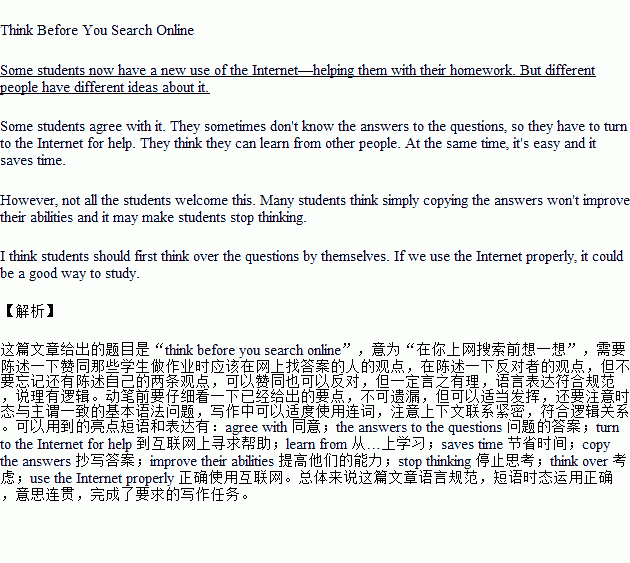ĖâÄŋÄÚČÝ
ĘéÃæąíīï
žŲÉčÄãÐĢΊÁËÅäšÏīī―ĻĄ°ÎÄŧŊÐĢÔ°ļßЧŋÎĖÃĄąŧîķŊĢŽŨî―üŌÔĄ°Ņ§ÉúŨöŨũŌĩĘąĘĮ·ņÓĶļÃÔÚÍøÉÏÕŌīð°ļĢŋĄąÎŠĖâŨöÁËŌŧļöĩũēéĄĢĩũēé·ĒÏÖŌŧÐĐŅ§ÉúÔÞģÉĢŽĩŦÐíķāŅ§Éú·īķÔÕâÖÖŨö·ĻĄĢĮëÄãļųūÝĩũēéĮéŋöšÍÏÂÁÐąíļņÖÐĩÄŌŠĩãĖáĘūĢŽŌÔĄ°Think Before You Search OnlineĄąÎŠĖâÓÃÓĒÓïÐīŌŧÆŠ80ĄŠ100īĘĩÄķĖÎÄĄĢ
ÔÞģÉÕß | 1.ēŧŧáŨöĖâ 2.Ņ§Ï°ąðČË 3.―ÚĘĄĘąžä |
·īķÔÕß | 1.ēŧĀûÓÚÄÜÁĶĖáÉý 2.ēŧĀûÓÚ˞Ύ·ĒÕđ |
ÄãŨÔžš | (ÖÁÉŲ2ĩã) |
ēÎŋžīĘŧãĢšability ÄÜÁĶ(ŋÉĘýÃûīĘ)
Think Before You Search Online
Some students now have a new use of the InternetĄŠhelping them with their homework. But different people have different ideas about it.
 ÃûĘĶ°éÄãģÉģĪŋÎʹ͎ē―Ņ§Á·ēâÏĩÁÐīð°ļ
ÃûĘĶ°éÄãģÉģĪŋÎʹ͎ē―Ņ§Á·ēâÏĩÁÐīð°ļFever Medicine ĄïTake the medicine once a day Ąï2 pills(ŌĐÍč) for an adult(over 18) 1 pill for a child(8--17) 1/2 pill for a kid(4--7) ĄïNot for kids under three | Fashion Mall ĄïBusiness hours: 9 a. m. --9 p. m. (Monday to Sunday) ĄïGoods for sale: clothes for men(lst floor) kids' clothes(2nd floor) clothes for women(3rd floor) toys and books(4th floor) |
Forest Zoo ĄïOver 80 animals: lions, tigers, pandas, monkeys, many kinds of birds... ĄïOpening hours: 9 a. tn. --4 p. m. (Monday to Friday); 8 a. m. --5 p. m. (Saturday and Sunday) ĄïĢĪ40 for an adult; half price for a student |
1.Kids would like to go to the floors at Fashion Mall.
A. 2nd and 4th B. 1st and 2nd C. 2nd and 3rd D. 1st and 3rd
2.You can buy all the things except at Fashion Mall.
A. clothes for men B. kids' clothes
C. fruit and vegetables D. toys and books
3.Linda and Tom can visit Forest Zoo at________.
A. 4:20 on Friday afternoon B. 4:30 on Sunday afternoon
C. 6: 00 on Saturday morning D. 8: 40 on Wednesday morning

